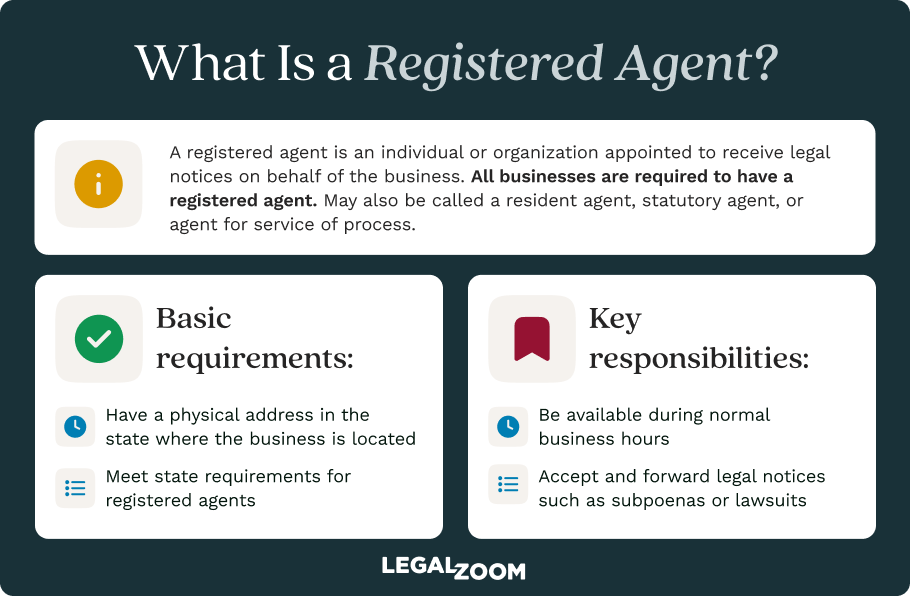There are several advantages to forming an LLC in Nevada, including liability protection, no state corporate income tax, and a straightforward filing process.
Here’s how the Nevada LLC formation process works, from naming your business and fulfilling filing requirements to obtaining a business license and registering for taxes.
How to get a Nevada LLC in 6 steps
An LLC is a popular business structure for small business owners thanks to the tax benefits and liability protection it offers. Starting a business can be overwhelming, but we’ve simplified the process with this seven-step guide to setting up your Nevada LLC.
1. Name your Nevada LLC
You'll need to choose a name to include in your articles before you can register your LLC. Names must comply with Nevada naming requirements. You can check Nevada’s Business Search tool to ensure that your business name is unique.
The following are the most important requirements to keep in mind:
- Your business name must include the words limited liability company, limited company, or limited, or the abbreviations Ltd., LC, LLC, or L.L.C. You are allowed to abbreviate the word “company.”
- Your name must be different from an existing business in the state. You can conduct a search on the Nevada Secretary of State's website to determine if a particular business name is in use.
- Some business types (including banks, insurance companies, and engineers) must be approved by specific regulating agencies before they can file an application with the Nevada Secretary of State.
- The Nevada Secretary of State will reject business names that contain restricted words (such as “bank,” “financial,” and “accountant”) if they lack the necessary approval.
If you aren't ready to register your LLC but are concerned your name might be taken by someone else, you can reserve it for a fee. It costs $25 to reserve a business name with the Nevada Secretary of State for 90 days. You can also pay a fee ranging between $25 to $125 for 24-hour expedited service. If you need faster service, you can pay an additional $500 for a 2-hour expedited process or $1,000 for 1-hour expedited service.
Keep in mind that if another business is already using your desired name, you won’t be able to reserve it.
2. Choose your registered agent
Nevada requires you to appoint a registered agent for your LLC.
A registered agent is a person or entity authorized to receive service of process and other official legal documents and notices on behalf of your LLC.
A registered agent can be a person (including yourself or an employee of your LLC) or an entity that offers a registered agent service.
Registered agents in Nevada must meet the following criteria:
- Entities (or companies) must provide registered agent services.
- The agent must have a street address in Nevada.
- The agent must be on-site and available to accept documents during regular business hours.
- A person serving as the registered agent must be over the age of 18 and reside in Nevada.
- Registered agents that serve 10 or more business entities are required to register as commercial registered agents with the Nevada Secretary of State.
- You can appoint yourself or one of your LLC’s employees as the registered agent if the person is a resident of Nevada and provides a residential or business street address in Nevada.

3. Prepare and file articles of organization
The articles of organization is a document that officially establishes your LLC by laying out basic information about it.
To register your Nevada LLC, you will need to prepare the articles of organization and file them with the Nevada Secretary of State. Though it sounds like a big job, that simply means filling out a relatively simple online form and submitting it.
You can find the Nevada LLC formation packet on the Nevada Secretary of State website, and either file online via Nevada’s SilverFlume portal or print and fill out the form and send it in by mail.
To prepare your articles, you'll usually need the following information:
- Your LLC name
- The name, address, and signature of your registered agent. Registered agents must also complete and sign a certificate of acceptance of appointment by registered agent
- Whether the company will be managed by managers or LLC members
- The name and address of each manager or managing member
- The name and address of each original manager or managing member
- The LLC’s dissolution date (if applicable)
- Whether the LLC is a “series” or “restricted” entity (if applicable)
- The name, address, and signature of the LLC’s organizer
Additionally, you have until the last day of the month following the month you filed the articles of organization to submit an initial list of officers and a business license to the Secretary of State.
Once you file your articles, the secretary of state will review the filing. If the articles are approved, the LLC becomes a legal business entity.
After your LLC has been approved, you can apply for an employer identification number (EIN), open business bank accounts, and obtain any permits or licenses needed to operate your business.
Starting a business takes courage. LegalZoom makes sure the legal details don’t stand in your way, from the day you register until the day you retire.

4. Create an operating agreement
An LLC operating agreement is a written document that outlines how the LLC will operate and be managed and each member’s rights and responsibilities.
While Nevada does not require an operating agreement, it is an essential component of your LLC.
Having a readily accessible LLC operating agreement form is helpful for various reasons, including settling disputes that may arise over financial agreements and other potential litigation.
Without an agreement in place, the courts make determinations based on state law, not necessarily what is in the best interest of the LLC and its members.
An operating agreement can also detail which member is responsible for ensuring that mandatory filings are completed.
For instance, Nevada LLCs must file an annual list of officers within 90 days of the end of the anniversary month of the filing of the articles of organization. If this list isn’t filed on time, the LLC’s status will be changed to “default” and will be revoked if it isn’t renewed. Other requirements may include out-of-state filings for Nevada LLCs that also operate out of state, and employer reporting for LLCs that have employees.
The operating agreement can include, but is not limited to, the following:
- LLC's name and principal address
- Duration of the LLC
- Name and address of the registered agent
- Information about the articles of organization
- Purpose of the business
- Members and their contribution
- The way profits and losses will be divided
- Procedure for admitting new members, as well as outgoing members
- Management of the LLC
- Indemnification and liability clauses
In Nevada, an operating agreement can be considered legally valid and enforceable once all members of the LLC have agreed to its terms.
5. Get an employer identification number and open a business bank account
If your LLC meets the IRS’ criteria (such as having more than one member or having employees), you will need to obtain an employer identification number (EIN) . The IRS assigns a nine-digit EIN to identify your LLC for tax purposes.
You can apply for an EIN online, for free, on the IRS website, or via fax or mail. If you are an international applicant, you can apply over the phone.
Once you have an EIN, you can use it for the following purposes:
- File and manage state and federal taxes
- Open a business bank account
- Hire employees
- Apply for business licenses
You can also get an EIN using LegalZoom’s EIN service. We guarantee accurate filing—fill out a quick questionnaire and we will get back with a confirmed EIN for your business.
Building a business is enough work as it is. We'll help you start your LLC with confidence.

6. Register for state taxes and business licenses
Businesses are legally required to register with the Nevada Department of Taxation to comply with tax collection and payment obligations and secure mandatory tax permits. Businesses selling, using, consuming, or storing goods in Nevada are required to register for tax permits. Tax permits are used to report and pay sales and use taxes.
You will need to register for a Sales/Use Tax Permit if your LLC is a non-retail business that sells or leases physical goods or offers a taxable service in Nevada.
You will need to register for a Consumer Use Tax Permit if your LLC is a non-retail business that doesn’t sell directly to the public but still uses, consumes, or stores physical goods that it hasn’t paid sales tax on.
You can register online through the Nevada Tax Center or by mail. If you apply online, you can expect to receive your tax permit within 24 hours of submitting the application. If you apply via mail, it can take several weeks or more to receive your tax permit.
Additionally, Nevada LLCs that have employees must pay unemployment insurance tax. Businesses with employees that have a quarterly payroll of at least $225 are required to register for Nevada’s Unemployment Compensation Program with the Nevada Employment Security Division. Most Nevada businesses with hired staff are also required to have workers’ compensation insurance.
You can apply for a Nevada state business license when you file your articles of organization. Note that you will need a business license to file your Nevada business taxes.
Check your county’s website to find out information about how to apply for specific local business licenses.
Next steps after forming your Nevada LLC
Taking the following steps after forming your Nevada LLC can help set your business up for success:
- Register a domain name. Even if you don't think you'll need a webpage, you probably will. At the very least, you should reserve the option of having one in the future by buying your domain name now. Before finalizing your LLC name, it's a good idea to check if the URL is available.
- Obtain a certificate of good standing. You may want to get a Certificate of Existence to verify your legal standing and business registration in Nevada. You can obtain a Certificate of Existence by mailing a letter with your LLC’s name and a $50 payment to the Nevada Secretary of State.
- Consider a foreign LLC. If your LLC is based in another state but you want to conduct business in Nevada, you will need to register as a foreign limited liability company with the Nevada Secretary of State.
Free Nevada Business Name Check
Use our free name check tool to search the Nevada Secretary of State database and see if your business name is available.
By clicking "Check Availability," I agree to LegalZoom's Terms of Use. This search is a preliminary check of state databases and does not include variations or trademarks. Results do not guarantee name availability or compliance with legal requirements.
Annual filing requirements for Nevada LLCs
Nevada's LLCs must file an annual report with the Nevada Secretary of State each year. The annual report must list officers, directors, and the registered agent. Nevada calls this report an annual list. The first annual list must be filed with the LLC's articles of organization. A copy is included with the articles of organization. Subsequent annual lists are due by the last day of the month of the anniversary of the LLC's formation.
You must file your state business license at the same time as your Initial or annual list of officers. The cost of the annual list of officers is $150. The cost of a Nevada state business license is $200 and must be renewed annually. The annual renewal fee for your Nevada state business license is due on the same day as the annual list of officers.
The cost of forming an LLC in Nevada
The cost of forming and maintaining an LLC in Nevada can include the following fees:
- Formation cost. $425 total for the articles of organization ($75), initial list of officers ($150), and state business license ($200)
- Annual costs. $350 total for the annual list ($150) and state business license ($200) renewals
- Other potential fees. Certificate of Existence ($50), reserving an LLC name ($25), expedited services ($125–$1,000)
The total cost of establishing and maintaining an LLC in Nevada typically ranges from $775 to $1,850.
Keep in mind that Nevada LLCs may also be required to make a quarterly tax payment.
LegalZoom can help you file your state's formation paperwork for as little as $0 + state filing fees.

How to start your Nevada LLC with LegalZoom
Starting your Nevada LLC is simple when you use our LLC formation services. You provide us with your business details and choose the services you need, and we take care of the rest.
Our LLC plans start at $0 plus state filing fees and provide step-by-step guidance for launching and protecting your business.
Start an LLC in Any State
FAQs
What are the benefits of registering a Nevada LLC?
Registering your LLC gives you a legal foundation to conduct business. Plan to keep your LLC compliant and in active status on the state's website.
A registered LLC also makes it possible for you to do the following:
- Obtain permits or licenses necessary to operate your business, including health department permits, zoning permits, home occupation permits, professional licenses, and more. Some states require a seller's permit to conduct sales
- Register your business with the state's tax agency
- Open a business bank account
- Apply for a business credit card
- Purchase insurance for your business
- Protect your name and logo with a trademark
How long does it take to form an LLC in Nevada?
The length of time it takes to form an LLC in Nevada depends on whether you apply online or via mail and whether you pay extra for expedited processing services. The Nevada Secretary of State has same-day processing for most online LLC filings. If you apply by mail, you can pay an additional fee for expedited processing.
How do I correct filing errors in NV?
You can fill out and sign a Certificate of Correction form and mail the form along with a $175 filing fee to the Nevada Secretary of State.
How do I dissolve an LLC in Nevada?
You can dissolve an LLC in Nevada by filling out and signing a Certificate of Dissolution/Cancellation form and submitting the form and a $100 filing fee to the Nevada Secretary of State. You can submit the form online through the SilverFlume portal or via mail.
Rudri Bhatt Patel contributed to this article.




